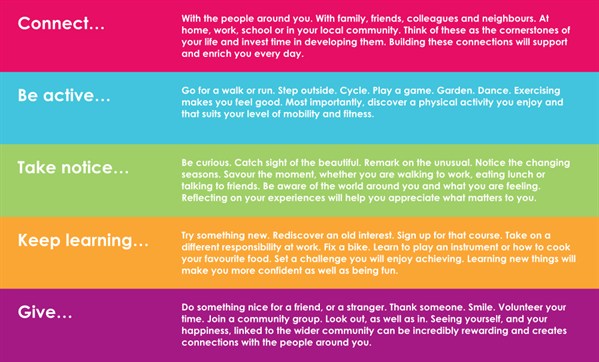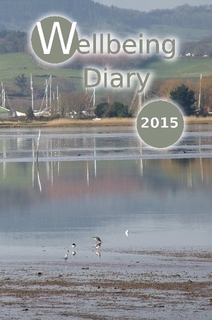Writing your way to happiness
03 Dec 2014 | Mary Turner

The positive psychology movement provides a wealth of evidence
to helps us understand what really makes for a happy and meaningful
life. Martin Seligman, the movement's founder,
extended his work on Authentic Happiness to propose that we can 'Flourish' by increasing the "positive emotion,
engagement, positive relationships, meaning and
accomplishment" (PERMA) in our lives.
Barbara Fredrickson has identified a range of
positive emotions which enhance our wellbeing when we experience
them. They include joy, gratitude, serenity, interest, hope, pride,
amusement, inspiration, awe, and love. These positive emotions
don't just feel good; they also broaden our capabilities and build
our resilience. Fredrickson suggests that we should ideally
experience a 'positivity ratio' of three positive emotions to
every negative one. So creating more positive emotional
experiences - and taking the time to notice and savour them -
is really important.
We are a social species and our happiness is also interconnected
to others. For example, spending money on others makes us happier than
spending it on ourselves. It has also been found that giving to
others, whether by buying gifts, volunteering, or simply being
supportive and kind, not only helps the recipient, but also makes
us happier as well. Acts of kindness have been shown to have a 'ripple effect' - people tend to pass them on.
You can find out more about ways to spread kindness via the Random
Acts of Kindness Foundation and World Smile
Day, which is about smiling and encouraging others to
smile. A simple, genuine smile brings positive emotions to
ourselves as well as to others.
In 2008 the New Economics Foundation produced the Five Ways to Wellbeing, a '5-a-day' for
wellbeing, as part of a government-backed Foresight Mental Capital and Wellbeing
Project.

The final report of the Foresight project identified that there
are clear health, financial and social benefits to policies that
contribute to people's happiness and wellbeing. It concluded that
policies should take account of their impact on wellbeing. rather
than simply on GDP. This has been followed by activities at both
the United Nations and OECD to encourage a shift to focusing on
wellbeing. In the UK this resulted in the introduction of a
programme to measure national wellbeing. So when you hear
news items about how happy (or unhappy) we are, this is where it
all comes from.
How can we enhance our own wellbeing?
Positivity and positive thinking may sound easy, but they're not!
As Oliver Burkeman pointed out in his book The Antidote, trying to think positive can,
perversely, have the opposite effect. Daniel Wegner found that when
people are asked not to think about a 'white bear', they find they
are automatically scanning their minds to check that they are not
thinking about white bears... and so, of course, they find that
they are.
Positive thinking is not about avoiding negative thoughts, or
about suppressing our anxieties; that simply doesn't work. It is
about recognising and accepting them, but checking that they are
reasonable, realistic and not over exaggerated. We can then turn
our attention towards some of the positives around us and focusing
on those things that help to improve our mood, rather than on those
that drag us down.
Research by Pennebaker showed that writing can really help us to do this as
it encourages us to examine our thoughts more methodically. Journal
writing has also been shown to be beneficial to wellbeing when it
focuses on the positives.
The good news is that, thanks to 'neuroplasticity' we can retrain our brains, and
teach ourselves to look for and notice positives we might
previously have missed, and to avoid dwelling unnecessarily on the
negatives - we may even be able to look for and find the small,
silver clouds when negatives do come along. It is ideal to
find a way to record those moments we wish to savour in life - and
writing something about them can be a good way of doing this.
I designed the Wellbeing Diary around the Five Ways to
Wellbeing and the simple idea that it would be good to look back on
each week and think about those events, moments and activities that
had helped me to "Connect, Be active, Take notice, Keep learning
and Give'.
Each week, alongside the appointments page, is a space devoted
to reflecting on the positives of the week. These can be small or
big events - a chance meeting with a friend and a 2 minute chat; a
special birthday celebration; getting a new job; soaking up the
sunshine for 10 minutes at lunch-break.
The purpose of the diary is to help us focus in on these
positives, to notice them and just savour them a little. I
have been keeping a diary in this way for three years now, and I
find I am much more aware of these small positive moments, and much
more able to balance my negative thoughts, when they come along,
with my positive emotions.
I don't write about any of the negatives in my diary - only the
positives make it in there (after all, I have no difficulty
focusing on the negatives so I don't need to practise that). I
don't write reams either - usually just a little reminder to myself
- and I don't always write something each day. I certainly don't
write in all 5 sections every single day!
Each week I also write down my 3 best moments for that week on
the reflective diary page (one of my favourite Sunday activities).
I enjoy writing in my diary - it doesn't take long (I don't want it
to be a chore!) and it works well for me.

Mary Turner is a supporter of Action for
Happiness, writer about wellbeing research and creator of the
Wellbeing Diary. You can order the diary from Amazon or from the publishers Lulu.com. All profits this year go to Action for
Happiness.